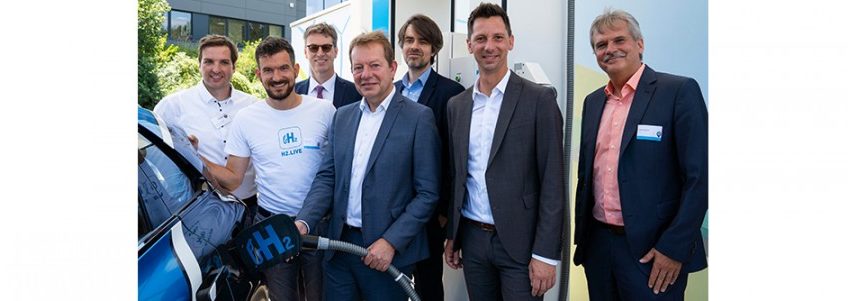Drivers of electric cars with fuel cells can now ‘gas up’ in Siegen as well. The owner/developer H2 MOBILITY Deutschland and its shareholder Linde today opened a hydrogen filling station in Siegen’s ‘Oberes Leimbachtal’ industrial park in the presence of the city’s mayor Steffen Mues. It is the 16th station in North Rhine-Westphalia, and yet another step in making Germany’s hydrogen supply network denser and denser.
The site in Leimbachtal is conveniently located by the A 45 motorway, an important link between Frankfurt am Main and Dortmund. The Siegen station was the first station to celebrate its opening during ‘NRW Week of Hydrogen’, ahead of Duisburg (25 Jun) and Aachen (28 Jun).
Mayor Steffen Mues officially opened the new hydrogen filling station at a ceremony to which he welcomed numerous guests from politics, business, and the neighbouring municipalities: “Siegen as a major city and regional centre now has a genuine USP. As a university town, commuter town, major centre, and important business location, we approach e-mobility from various perspectives, in the context of climate protection as well as regional competitiveness.”
Mues emphasised that the H2 filling station in Siegen was not least the result of excellent cooperation between local protagonists. “The decisive factor for Siegen as a location was the application submitted by the ‘H2-Siegerland’ network on the initiative of the city of Siegen, the district of Siegen-Wittgenstein, the University of Siegen, as well as companies and business associations.
Philipp Braunsdorf from NOW GmbH, Government Director Jörn Guddat of the Arnsberg District Government as well as District Administrator Andreas Müller for the Siegen-Wittgenstein District, conveyed best wishes on behalf of the Federal and State Governments.
The owner/developer of the station is H2 MOBILITY Deutschland, a joint venture that is expanding Germany’s hydrogen infrastructure. The filling station technology was developed by the gas and technology company Linde. Other H2 filling stations in North Rhine-Westphalia are already in operation today in Essen, Wuppertal, Münster, Düsseldorf, Leverkusen, and Frechen, and most recently in Mönchengladbach as well.
The hydrogen station in Siegen is state-of-the-art, and driver-side operation of the filling facilities is intuitive: the process is similar to refuelling conventional vehicles and takes three to five minutes. The facility is equipped with Linde’s IC90 ionic compressor. The ‘Siegerland’ application won with their integrated model project ‘E-mobility hoch 3’ (e-mobility to the power of 3), which advocates the system integration of technology, infrastructure, and services relating to electromobility. A mobility centre with various applications and sharing services is currently being set up in the industrial estate, and is expected to enrich the region’s vocational training and labour market as well.
The hydrogen station in Siegen is supported by the Federal Ministry of Transport and Digital Infrastructure (BMVI) under the NIP, the National Innovation Programme for Hydrogen and Fuel Cell Technology. The total investment expenditure for the filling station in Siegen amounts to € 1,579,446. The station received a subsidy of € 947,668.
Hydrogen offers a chance to expand the range of fuels available in the transport sector in a climate-friendly way, because using hydrogen produced with renewable energy can significantly reduce climate-damaging CO2 emissions. Operating a hydrogen-powered fuel-cell vehicle causes no local pollutants or carbon dioxide (CO2) emissions. The range of these vehicles is between 500 and 700 kilometres on a full tank.
For hydrogen-powered electromobility to become a success story, an attractive range of fuel-cell vehicles and a nationwide infrastructure are needed. The expansion of the corresponding service-station network is progressing well. There are currently 70 H2 filling stations in Germany; by the end of the year, there will be 100 stations nationwide.


